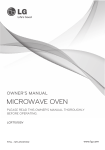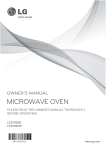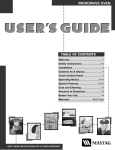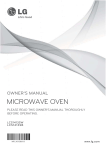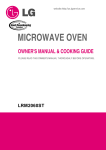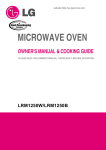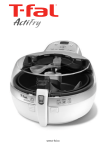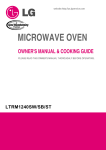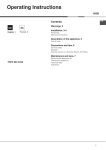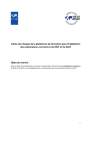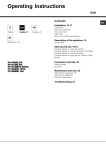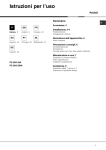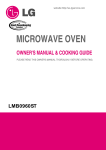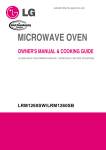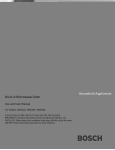Download LG LTM9020B User's Manual
Transcript
website:http://www.lgservice.com LTM9020W/LTM9020B SAFETY PRECAUTIONS TO AVOID POSSIBLE EXPOSURE TO EXCESSIVE MICROWAVE ENERGY ... • Do not attempt to operate this oven with the door open, since open-door operation can result in harmful exposure to microwave energy. It is important not to defeat or tamper with the safety interlock. • Do not operate the oven if it is damaged. It is particularly important that the oven door close properly and that there is no damage to the: – door (bent) – hinges and latches (broken or loosened) – door seals and sealing surfaces. • Do not place any object between the oven front face and the door, or allow soil or cleaner residue to accumulate on sealing surfaces. • The oven should not be adjusted or repaired by anyone except properly qualified service personnel. GROUNDING INSTRUCTIONS This appliance must be grounded! If an electrical short circuit occurs, grounding reduces the risk of electric shock by providing an escape wire for the electric current. This appliance is equipped with a cord having a grounding wire with a grounding plug. Put the plug into an outlet that is properly installed and grounded. WARNING If you use the grounding plug improperly, you risk electric shock. Ask a qualified electrician or the Service if you do not understand the grounding instructions or if you wonder whether the appliance is properly grounded. This appliance has a short power supply cord to reduce the risk of anyone’s tripping over or becoming entangled in the cord. You may use an extension cord if you are careful. If you use an extension cord, be sure that: • The extension cord has the same electrical rating as the appliance. • The marked rating of the extension cord shall be equal to or greater than the electrical rating of the appliance. • The extension cord is a grounding-type 3-wire cord. • The extension cord does not drape over a countertop or tabletop, where it can be pulled on by children or tripped over accidentally. • The electrical cord is dry and not pinched or crushed in any way. NOTE: This oven draws 11.5 amperes at 120 Volts, 60 Hz. 3 SAFETY - MICROWAVE IMPORTANT SAFETY INSTRUCTIONS The safety instructions below will tell you how to use your oven to avoid harm to yourself or damage to your oven. WARNING - To reduce the risk of burns, electric shock, fire, injury to persons, or exposure to excessive microwave energy: 1. Read all instructions before using the appliance. 2. Read and follow the specific PRECAUTIONS TO AVOID POSSIBLE EXPOSURE TO EXCESSIVE MICROWAVE ENERGY found on page 3 of this manual. 3. This appliance must be grounded. Connect only to properly grounded outlet. See GROUNDING INSTRUCTIONS found on page 3 of this manual . 4. Install or locate this appliance only in accordance with the provided installation instructions. 5. Some products, such as whole eggs and sealed containers – for example, closed glass jars are able to explode and should not be heated in this oven. 6. Use this appliance only for its intended use as described in the manual. Do not use corrosive chemicals or vapors in this appliance. This type of oven is specifically designed to heat, cook, or dry food. It is not designed for industrial or laboratory use. 7. As with any appliance, close supervision is necessary when used by children. 8. Do not operate this appliance if it has a damaged cord or plug, if it is not working properly, or if it has been damaged or dropped. 9. This appliance should be serviced only by qualified service personnel. Contact the nearest authorized service facility for examination, repair, or adjustment. 10. Do not cover or block any openings on the appliance. 11. Do not store this appliance outdoors. Do not use this product near water – for example, near a kitchen sink, in a wet basement, near a swimming pool, or similar location. 12. Do not immerse cord or plug in water. 13. Keep cord away from heated surfaces. 14. Do not let cord hang over the edge of a table or counter. 15. When cleaning surfaces of door and oven that come together on closing the door, use only mild, nonabrasive soaps or detergents applied with a sponge or soft cloth. 16. To reduce the risk of fire in the oven cavity: a. Do not over cook food. Carefully attend appliance when paper, plastic, or other combustible materials are placed inside the oven to facilitate cooking. b. Remove wire twist-ties from paper or plastic bags before placing bag in oven. c. If materials inside the oven ignite, KEEP OVEN DOOR CLOSED, turn oven off, and disconnect the power cord or shut off power at the fuse or circuit breaker panel. d. Do not use the cavity for storage purposes. Do not leave paper products, cooking utensils, or food in the cavity when not in use. 17. Liquids, such as water, coffee, or tea are able to be overheated beyond the boiling point without appearing to be boiling. Visible bubbling or boiling when the container is removed from the microwave oven is not always present. THIS COULD RESULT IN VERY HOT LIQUIDS SUDDENLY BOILING OVER WHEN THE CONTAINER IS DISTURBED OR A SPOON OR OTHER UTENSIL IS INSERTED INTO THE LIQUID. To reduce the risk of injury to persons; 1) Do not overheat the liquid. 2) Stir the liquid both before and halfway through heating it. 3) Do not use straight-sided containers with narrow necks. 4) After heating, allow the container to stand in the microwave oven for a short time before removing the container. 5) Use extreme care when inserting a spoon or other utensil into the container. 18. Avoid heating small-necked containers such as syrup bottles. 19. Avoid using corrosive and vapors, such as sulfide and chloride. 20. Liquids heated in certain shaped containers (especially cylindrical-shaped containers) may become overheated. The liquid may splash out with a loud noise during or after heating or when adding ingredients (instant coffee, etc.), resulting in harm to the oven and possible injury. In all containers, for best results, stir the liquid several times before heating. Always stir liquid several times between reheatings. SAVE THESE INSTRUCTIONS 4 SAFETY - TOASTER IMPORTANT SAFETY INSTRUCTIONS When using electrical appliances, especially when children are present, basic safety precautions should always be followed, including the following: 1.Read all instructions before using your toaster. 2.Do not touch hot surfaces. 3.To protect against electrical hazards, do not immerse cord, plug, or the appliance in water or other liquid. 4.Close supervision is necessary when any appliance is used by or near children. 5.Unplug from outlet when not in use and before cleaning. Allow to cool before putting on or taking off parts and before cleaning. 6.Do not operate any appliance with a damaged cord or plug or after the appliance malfunctions or has been dropped or damaged in any manner. Return appliance to the nearest authorized service center for examination, repair or electrical or mechanical adjustment. 7.The use of attachments not recommended by the manufacturer may cause hazards. 8.Keep the cord away from heated surfaces. Do not let the cord hang over the edge of table or counter, as it could be pulled off. 9.Do not use outdoors. 10.Do not place on or near a hot gas or electric burner or in a heated oven. 11.Do not use the appliance for other than its intended use. 12.Oversized foods, metal foil packages or utensils must not be inserted in this appliance, as they may create a fire or electrical hazards. 13.A fire may occur if this toaster is covered or touching flammable material, including curtains, draperies, walls, etc., when in operation. 14.Do not attempt to dislodge food when this appliance is plugged in. 15.Toast Door must be closed before attaching or disconnecting the plug from wall outlet. 16.Do not close with metal scouring pads. Pieces can burn off the pad and touch electrical parts involving a risk of electric shock. 17.Do not use paper products when appliance is operated in the toaster mode. 18.Do not store any materials, other than manufacturer’s recommended accessories, in this oven when not in use. 19.Do not cover crumb tray or any other part of the oven with metal foil. This will cause overheating of this appliance. 20.Extreme caution must be used when moving an appliance containing hot oil or other hot liquids. 21. Do not toast oversized bagel. Because thick bagel’s surface may become closer to the heater, this may cause overdone of surface and smoke. SAVE THESE INSTRUCTIONS! 5 UNDERSTANDING YOUR TOASTER COMBO SPECIFICATIONS Power Supply 120 V AC, 60 Hz Rated Power Consumption 1,350 W Output *900 W Microwave Toaster 800W Rated Current 11.5 A Overall Dimensions (WxHxD) 21 / ” x 123/16” x 169/16” 5 16 Oven Cavity Dimensions (WxHxD) 131/2” x 811/16” x 143/16” Capacity of Oven Cavity 0.9 Cu. Ft. *IEC 60705 RATING STANDARD Specifications subject to change without prior notice. INSTALLATION NOTES: • Never place the turntable in the oven upside down. A. Circuits For safety purposes this oven must be plugged into a 20 Amp circuit. No other electrical appliances or lighting circuits should be on this line. If in doubt, consult a licensed electrician. D. Do not block the air vents All air vents should be kept clear during cooking. If air vents are covered during oven operation the oven may overheat. In this case, a sensitive thermal safety device automatically turns the oven off. The oven will be inoperable until it has cooled sufficiently. B. Voltage Warning The voltage used at the wall receptacle must be the same as specified on the oven name plate located on the back or on the side of the control panel of the oven. Use of a higher voltage is dangerous and may result in a fire or other type of accident causing oven damage. Low voltage will cause slow cooking. In case your microwave oven does not perform normally in spite of proper voltage, remove and reinsert the plug. E. Radio interference 1. Microwave oven operation may interfere with TV or radio reception. 2. When there is interference, it may be reduced or eliminated by taking the following measures: a. Clean the door and the sealing surfaces of the oven. b. Reorient the receiving antenna of radio or TV. c. Relocate the microwave oven in relation to the TV or radio. d. Move the microwave oven away from the receiver. e. Plug the microwave oven into a different outlet so that microwave oven and receiver are on different branch circuits. C. Placement of the Oven Your microwave oven can be placed easily in your kitchen, family room, or anywhere else in your home. Place the oven on a flat surface such as a kitchen countertop or a specially designed microwave oven cart at least 100cm (39.4 inches) from floor. Do not place oven above a gas range. Free air flow around the oven is important. Allow at least 4 inches of space at the top, sides, and back of the oven for proper ventilation. 4 inches 4 inches 4 inches 6 UNDERSTANDING YOUR TOASTER COMBO PARTS AND ACCESSORIES Control Panel Toaster Indicator Light Toaster Door Crumb Tray Microwave Oven Toaster See-Through Door Easy-Clean Oven Cavity Slots Safety Interlock System Glass Turntable Your oven comes with the following accessories: 1 Owner’s Manual and Cooking Guide 1 Glass Turntable 1 Rotating Ring Rotating Ring 7 UNDERSTANDING YOUR TOASTER COMBO CONTROL PANEL MICROWAVE CONTROL AREA 1. DISPLAY. The Display includes a clock and indicators that tell you time of day, cooking time settings, and cooking functions selected. 2. STOP/CLEAR. Touch this pad to stop the oven or clear entries. 3. START. Touch this pad to start all entries (except the Auto Cook and Add Minute function which start automatically) and to turn Child Lock on or off. 4. AUTO COOK. Touch this pad to select programming food items. 5. Ez-ON. Touch this pad to cook at 100% cook power for 1 minute to 99 minutes 59 seconds. 6. AUTO DEFROST. This pad is an accurate defrosting method for frozen meat, poultry and fish up to 6.0 lbs. 7. COOK TIME. Touch this pad to set a cooking time. 8. POWER. Touch this pad to set a cooking power. 9. CLOCK. Touch this pad to set the time of day. 10. KITCHEN TIMER. Touch this pad to use your microwave oven as a kitchen timer. 11. NUMBER PADS. Touch Number Pads to enter cooking time, power level, quantities, or weights. TOASTER CONTROL AREA 1 5 3 2 5 4 6 1. Toast. Toast bread 2. Bagel. Toasts Bagels 3. Stop/Clear. Touch this pad to stop the toaster or clear entries. 4. Start. Touch this pad to start the toasting process. 5. Darkness Control. Adjust darkness control to desired setting before cooking foods. (Default : 5, "1" is the lightest and "9" is the darkest) 6. Indicator Light. When operating toaster with door closed, this will be illuminated. If you open the door during toasting, this will blink. 8 USING YOUR MICROWAVE OVEN COOKWARE GUIDE Most heat-resistant, non-metallic cookware is safe for use in your microwave oven. However, to test cookware before using, follow these steps: 1. Place the empty cookware in the microwave oven. 2. Measure 1 cup of water in a glass measuring cup and place it in the oven beside the cookware. 3. Microwave on 100% power for 1 minute. If the dish is warm, it should not be used for microwave cooking. USE DO NOT USE Ovenproof Glass Metal Utensil • Glass treated for use in high-intensity heat includes utility dishes, bread dishes, pie plates, cake plates, liquid measuring cups, casseroles, and bowls without metallic trim. • Metal shields food from microwave energy and produces uneven cooking. Avoid metal skewers, thermometers, or foil trays. • Metal utensils can cause arcing, which is a discharge of electric current. Arcing can damage your microwave oven. China • Bowls, cups, serving plates, and platters without metallic trim can be used in your oven. Metal Decoration • Do not use metal-trimmed or metal-banded dinnerware, casserole dishes, etc. Plastic • When using plastic wrap as a cover, make sure that the dish is deep enough so the plastic wrap does not touch the food. As the food heats, it may melt the plastic wrap wherever the wrap touches the food. • Place plastic wrap loosely over the top of the dish and secure it by pressing the wrap to the sides of the dish. • Vent by turning back one corner of the plastic wrap. This will allow excess steam to escape. • Use plastic dishes, cups, semi-rigid freezer containers, and plastic bags only for short time cooking. Use these with care because the plastic may soften from the heat of the food. Centura™ Tableware • The Corning Company recommends that you do not use Centura tableware and some Corelle™ closed-handle cups for microwave cooking. Aluminum Foil • Avoid large sheets of aluminum foil because they hinder cooking and may cause arcing. • Use small pieces of foil to shield poultry legs and wings. • Keep all aluminum foil at least 1 inch from the walls and door of the oven. Paper Wood • Microwave-safe paper towels, waxed paper, paper napkins, and paper plates with no metallic trim or design can be used in your oven. • Refer to the manufacturer’s label for use of any paper product in the microwave oven. • Wooden bowls, boards, and baskets will dry out and may split or crack when you use them in the microwave oven. Tightly Closed Containers • Tightly closed cookware can explode. Be sure to leave an opening for steam to escape from covered cookware. Brown Paper • Avoid using brown paper bags. They absorb heat and could burn. Metal Twist Ties • Always remove metal twist ties as they can become hot and cause a fire. 9 USING YOUR MICROWAVE OVEN TIPS FOR MICROWAVE COOKING BROWNING Meat and poultry with high fat content that are cooked for 10 or 15 minutes or longer will brown lightly. Foods cooked a shorter time can be brushed with a browning agent, such as Worcestershire sauce, soy sauce, or barbecue sauce. ARRANGEMENT Do not stack food. Arrange in a single layer in the dish for more even cooking. Because dense foods cook more slowly, place thicker portions of meat, poultry, fish, and vegetables toward the outside of the dish. TESTING FOR DONENESS Because foods cook quickly in a microwave oven, you need to test frequently for doneness. COVERING A cover traps heat and steam and causes the food to cook more quickly. Use a lid or microwave-safe plastic wrap with one corner folded back to vent the excess steam. Lids on glass casseroles can become hot during cooking. Handle carefully. Waxed paper will prevent the food from splattering in the oven and help retain heat. When warming bread items, use waxed paper, napkins, or paper towels. To absorb extra moisture, wrap sandwiches and fatty foods in paper towels. STANDING TIME Depending on density, food often needs to stand from 2 to 15 minutes after you remove it from the oven. Usually, you need to cover food during standing time to retain heat. Remove most foods when they are slightly undercooked and they will finish cooking during standing time. The internal temperature of food will rise about 10 °F during standing time. SPACING Arrange individual foods, such as baked potatoes, cupcakes, and hors d’oeuvres in a circle and at least 1 inch apart. This will help the food cook more evenly. SHIELDING To prevent some portions of rectangular or square dishes from overcooking, you may need to shield them with small strips of aluminum foil to block the microwaves. You can also cover poultry legs and wing tips with foil to keep them from overcooking. Always keep foil at least 1 inch from oven walls to prevent arcing. STIRRING Stirring blends flavors and redistributes the heat in foods. Always stir from the outside toward the center of the dish. Food at the outside of the dish heats first. PIERCING Pierce the shell, skin, or membrane of foods before cooking to prevent them from bursting. Foods that require piercing include yolks and whites of eggs, hot dogs, clams, oysters, and whole vegetables, such as potatoes and squash. TURNING Large foods, such as roasts and whole poultry, should be turned so that the top and bottom cook evenly. Also turn over chicken pieces and chops. CLEANING THE MICROWAVE • The turntable may be cleaned at the sink. Be careful not to chip or scratch the edges as this may cause the turntable to break during use. • The turntable roller rest should be cleaned regularly. Wipe the oven inside and outside with a soft cloth and a mild detergent solution. Then rinse and wipe dry. This should be done weekly or more often, if needed. Never use cleaning powders or rough pads. Excessive oil splatters on the inside top will be difficult to remove if left for many days. Wipe splatters with a wet paper towel, especially after cooking chicken or bacon. SPECIAL CARE For best performance and safety, the inner door panel and the oven front frame should be free of food or grease buildup. Wipe often with a mild detergent; then rinse and wipe dry. Never use cleaning powders or rough pads. REMOVABLE PARTS The turntable and turntable roller rest are removable. They should be hand-washed in warm (not hot) water with a mild detergent and a soft cloth. Once they are clean, rinse well and dry with a soft cloth. Never use cleaning powders, steel wool, or rough pads. After cleaning the control panel, touch STOP/CLEAR to clear any entries that might have been entered accidentally while cleaning the panel. 10 USING YOUR MICROWAVE OVEN CHILD LOCK CLOCK Use this safety feature to lock the control panel when you are cleaning the oven, or so that children cannot use the oven unsupervised. Example: To set the clock for 10:30(AM). Touch: Display Shows: To set CHILD LOCK: 1. 12:00 Touch: Display Shows: 2. 10:30 1. Time of day. 3. 10:30 2. KITCHEN TIMER Your microwave oven can be used as a kitchen timer. You can set up to 99 minutes, 99 seconds. To cancel CHILD LOCK: Touch: Example: To set 3 minutes. Touch: 1. Touch and hold until “L” appears in the display. (approximately 4 seconds) Display Shows: Display Shows: 1. Timer : 0 Timer 2. 3:00 3. Starts timer. 11 Touch and hold until “L” disappears from the display. (approximately 4 seconds) USING YOUR MICROWAVE OVEN AUTO COOK Ez-ON Use this function to cook food without entering a cook time or power. You don’t need to touch START. Automatically microwave cooking will start. Refer to the “Auto Cook Table” below for more information. A time-saving pad, this simplified control lets you quickly set and start microwave cooking at 100% power without the need to touch START. Example: To cook 2 patatoes. Touch: Display Shows: 1. Time of day. Touch: Example: To cook for 2 minutes. Display Shows: 1. Time of day 2. Twice Starts cooking. MWO 2. 2 Twice NOTE: Each time you touch Ez-ON, it will add 1 minute up to 99 min 59 seconds. 3. Starts AUTO COOK after 4 seconds. AUTO COOK TABLE CODE CATEGORY Potato Popcorn DIRECTION AMOUNT Pierce each potato with a fork and place on the oven tray around the edge, at least one inch apart. After cooking, allow to stand for 5 minutes. 1 - 4 medium approx. 10 oz. each Place only one bag of prepackaged microwave popcorn on the center of turntable. Regular size (3.0 - 3.5 oz.) Fresh Vegetable Prepare as desired, wash, and leave residual water on the vegetables. Place in an appropriately-sized microwave container. Add amount of water according to the quantity. (1-2 cups: 2 tablespoons, 3-4 cups: 4 tablespoons) Cover with plastic wrap and vent. After cooking, allow to stand for 3 minutes. 1 - 4 cups Beverage Use a wide-mouth mug. Do not cover. (Be careful! The beverage will be very hot! Sometimes liquids heated in cylindrical containers will splash out when the cup is moved.) 1 - 2 cups Dinner plate Place foods to be heated on dinner plate or similar dish. Cover with plastic wrap and vent. After cooking, allow to stand for 3 minutes. 1-2 servings (Approx. 10 -16 oz.) Frozen Entree Remove from outer display package. Slit cover. If not in microwave safe container, place on plate, cover with plastic wrap and vent. After cooking, allow to stand for 3 minutes. 12 10.5 oz. USING YOUR MICROWAVE OVEN NOTE: When you touch the START pad, the display changes to defrost time count down. The oven will beep during the DEFROST cycle. At this time, open the door and turn, separate, or rearrange the food. Remove any portions that have thawed. Return frozen portions to the oven and touch START to resume the defrost cycle. AUTO DEFROST Three defrost sequences are preset in the oven. The auto defrost feature provides you with the best defrosting method for frozen foods. The cooking guide will show you which defrost sequence is recommended for the food you are defrosting. For added convenience, the Auto Defrost includes a built-in beep mechanism that reminds you to check, turn over, separate, or rearrange to get best defrost results. Three different defrosting levels are provided. OPERATING TIPS • For best results, remove fish, shellfish, meat, and poultry from its original closed paper or plastic package (wrapper). Otherwise, the wrap will hold steam and juice close to the foods, which can cause the outer surface of the foods to cook. • For best results, shape your ground meat into the form of a doughnut before freezing. When defrosting, scrape off thawed meat when the beep sounds and continue defrosting. • Place foods in a shallow container or on a microwave roasting rack to catch drippings. • Food should still be somewhat icy in the center when removed from the oven. 1 MEAT 2 POULTRY 3 FISH *Available weight is 0.1~6.0 lbs. Example: To defrost 1.2 lbs of poultry. Touch: 1. Display Shows: Twice Defrost MWO Defrost MWO 2. 1.2 lbs to enter the weight 3. Starts defrosting. 13 USING YOUR MICROWAVE OVEN AUTO DEFROST TABLE Category def-1 (MEAT) TIMED COOKING Food to be Defrosted This feature lets you program a specific cook time and power. For best results, there are 10 power level settings in addition to HIGH power (100%). Refer to the “Microwave Power Level Table” on page 15 for more information. Beef Ground beef, Round steak, Cubes for stew, Tenderloin steak, Pot roast, Rib roast, Rump roast, Chuck roast, Hamburger patty Lamb Chops (1 inch thick), Rolled roast Pork Chops ( 1 ⁄2 inch thick), Hot dogs, Spareribs, Country-style ribs. Rolled roast, Sausage Veal Cutlets (1 lb., 1 ⁄2 inch thick) NOTE: If you do not select a power level, the oven will automatically cook at HIGH (100%) power. Example: To cook for 5 minutes, 30 seconds at 80% power. Touch: Display Shows: MWO def-2 (POULTRY) def-3 (FISH) Poultry Whole (under 4 lbs.), Cut-up, Breasts (boneless) Cornish Hens Whole Turkey Breast : 0 1. enter cooking time MWO Steaks/Chops Round beef steak, Tenderloin steak Lamb chops (1 inch thick) Pork chops (1/2 inch thick) Veal cutlets (1 lbs, 1/2 inch thick) Fish and Fillets, Whole Steaks Shellfish Crab meat, Lobster tails, Shrimp, Scallops 2. 5:30 3. p-hi 4. p-8o MWO MWO 5. 14 Starts cooking. USING YOUR MICROWAVE OVEN MICROWAVE POWER LEVELS MULTI-STAGE COOKING Your microwave oven has 10 cook power levels to let you cook or heat a wide variety of foods. Refer to the table below for suggestions: For best results, some recipes call for different cook powers during different stages of a cook cycle. You can program your oven to switch from one power level to another for up to 2 stages. Microwave Power Level Table Example: To set 2-stage cook cycle. Touch: Power Level Display Shows: MWO 1. : 0 2. 3:00 10 (High) MWO To set 3 minute cook time for first stage. MWO 3. 4. p-hi To set 80% cook power for the first stage. MWO p-8o MWO 5. : 0 MWO 6. MWO p-hi 7. 8. 9. 10. To set 50% cook power for the second stage. MWO p-50 Starts cooking. When the first stage is over, you will hear two short tones as the oven begins the second cook stage. 15 • • • • • Boiling water. Making candy. Cooking poultry pieces, fish, & vegetables. Cooking tender cuts of meat. Whole poultry. 9 • Reheating rice, pasta, & vegetables. 8 • Reheating prepared foods quickly. • Reheating sandwiches. 7 • Cooking egg, milk, & cheese dishes. • Cooking cakes, breads. • Melting chocolate. 6 • Cooking veal. • Cooking whole fish. • Cooking puddings & custard. 5 • Cooking ham, whole poultry, & lamb. • Cooking rib roast, sirloin tip. 4 • Thawing meat, poultry, & seafood. 3 • Cooking less tender cuts of meat. • Cooking pork chops, roast. 2 • Taking chill out of fruit. • Softening butter. 1 • Keeping casseroles & main dishes warm. • Softening butter & cream cheese. 0 • Standing time. 7:00 To set 7 minute cook time for second stage. Use USING YOUR MICROWAVE OVEN WARNING: Do not use aluminum foil during cooking cycle. COOKING TIPS Meat Poultry 1. No special techniques are required. Meat should be prepared as with conventional cooking. Season if desired. Always thoroughly defrost meat before cooking. 2. Place the meat on a microwave roasting rack or microwave-proof plate and place on the turntable. 3. Cook according to the Meat Cooking Table (below). Use the longer time for large cuts of meats and the shorter time for small cuts of meats. For thicker chops, use the longer time. 4. Turn the meat once halfway through the cooking time. 5. Let stand for 5-10 minutes wrapped in foil after cooking. The standing time is very important as it completes the cooking process. 6. Make sure meat, especially pork, is thoroughly cooked before eating. 1. No special techniques are required. Poultry should be prepared as with conventional cooking. Season if desired. 2. Poultry should be thoroughly defrosted. Remove giblets and any metal clamps. 3. Prick the skin and brush lightly with vegetable oil unless the poultry is self-basting. 4. All poultry should be placed on a microwave roasting rack or a microwave-proof plate and placed on the turntable. 5. Cook according to the instructions in the Poultry Cooking Table below. Turn over halfway through the cooking time. Because of its shape, poultry has a tendency to cook unevenly, especially in very bony parts.Turning during roasting helps to cook these areas evenly. 6. Let stand for 5-10 minutes wrapped in foil after cooking before carving. The standing time is very important, as it completes the cooking process. 7. Make sure poultry is thoroughly cooked before eating. Whole poultry is completely cooked when the juices run clear from the inside thigh when it is pierced with a sharp knife. Poultry pieces should be pierced with a sharp knife through the thickest part to ensure that the juices are clear and the flesh is firm. Meat Cooking Table Meat Microwave Power BEEF Standing/Rolled Rib 8 – Medium 8 – Well-done HIGH(100%) Ground Beef (to brown for casserole) Hamburgers, Fresh or defrosted (4 oz. each) HIGH(100%) – 2 patties HIGH(100%) – 4 patties PORK Loin, Leg Bacon – 4 slices – 6 slices Cooking Time Per Pound 91/2 to 111/2 minutes 111/2 to 14 minutes 61/2 to 91/2 minutes Poultry Cooking Table Microwave Power Cooking Time Per Pound CHICKEN Whole Breast (boned) Portions 8 8 8 11 to 15 minutes 10 to 14 minutes 11 to 17 minutes TURKEY Whole 8 11 to 15 minutes Poultry 21/2 to 41/2 minutes 31/2 to 51/2 minutes 8 121/2 to 161/2 minutes HIGH(100%) HIGH(100%) 21/2 to 31/2 minutes 31/2 to 41/2 minutes NOTES: • The times listed above are only a guide. Allow for difference in individual tastes and preferences. The times may also vary due to the shape, cut, and composition of the food. • If whole poultry is stuffed, the weight of the stuffed bird should be used when calculating the cooking time. NOTE: The times listed above are only a guide. Allow for difference in individual tastes and preferences. The times may also vary due to the shape, cut, and composition of the food. 16 USING YOUR MICROWAVE OVEN COOKING TIPS (continued) Fish 1. Arrange fish in a large shallow non-metallic dish or casserole. 2. Cover with pierced microwave plastic wrap or casserole lid. 3. Place the dish on the turntable. 4. Cook according to the instructions in the Fresh Fish Cooking Table below. Flakes of butter can be added to the fish if desired. 5. Let stand as directed in the Cooking Table before serving. 6. After standing time, check to see that the fish is thoroughly cooked. The fish should be opaque and flake easily. Fresh Fish Cooking Table Fish Microwave Cooking Time Power Per Pound Butter Standing Time Fish Fillets HIGH 41/2 to 8 minutes Add 15 to 30 ml (1 to 2 tbsp lemon juice) 2 to 3 minutes Whole Mackerel, Cleaned and Prepared HIGH 41/2 to 8 minutes – 3 to 4 minutes Whole Trout, Cleaned and Prepared HIGH 51/2 to 9 minutes – 3 to 4 minutes Salmon Steaks HIGH 51/2 to 8 minutes Add 15 to 30 ml (1 to 2 tbsp lemon juice) 17 3 to 4 minutes USING YOUR TOASTER TIPS FOR TOASTER IMPORTANT Before using the toaster for the first time, set the Darkness Control at medium and operate the toaster without bread in order to burn off residues on the heating elements. You will notice an odor that is characteristic of new heating elements. This is normal and will soon disappear. MAINTANANCE This toaster requires little maintenance. It contains no user-serviceable parts inside the housing. Do not remove the cover. Contact qualified Service Center, if the product requires servicing. CLEANING THE TOASTER Always unplug the Toast N Wave and allow the toaster to cool completely before cleaning. Exterior : Wipe surface with a soft, clean, damp cloth. Never use abrasive cleaners, as they may scratch the surface. Interior : If food jams in the slots, disconnect Toast N Wave plug from wall outlet and wait until cooled completely. Remove food with wooden tongs. Do not use fork or other sharp, metal object to clean inside of the toaster, or to remove toast, as it may damage heating elements. Crumb Tray : After allowing the toaster to cool down and closing the door, gently slide out the crumb tray. Brush crumbs off the tray and, if necessary, wipe it with a clean, damp cloth. Always dry the tray thoroughly. When sliding the crumb tray into place, be sure you feel and hear it snap into position. COOKING TIPS WARNING Never place any object in the toaster for any reason! • DO NOT toast pastries with runny fillings or frosting. • DO NOT toast torn slices of bread or broken pastries. • DO NOT place buttered bread, wrapped food, or frozen pastries in the toaster. • DO NOT use this toaster to toast or warm small-size bread slices. These include "melba" size breads, slices of mini-baguettes, breadsticks, etc. • DO NOT toast oversized bagel. Because thick bagel’s surface may become closer to the heater, this may cause overdone of surface and smoke. NOTE: Different types of bread and their moisture levels may require different darkness settings. For example, dry bread will brown more rapidly than moist bread and so will be toasted to your taste at a lighter setting. 18 USING YOUR TOASTER OPERATING INSTRUCTION • Make sure the crumb tray is pushed all the way in place before plugging toaster into wall outlet. • Remove all protective wrappings from food before placing into toasting slots. Place bread into slots and Close the door. Then select one mode (Toast/Bagel) and press the Darkness Control to the desired setting (experiment to suit individual taste). When you press the Start button, the heating element will turn on. • Centering guides will automatically center the food for even browning. However, uneven browning may occur if you are only using one toasting slot. If you operate toaster several times using one slot continuously, the toaster’s internal temperature will be hot and may cause "Hot" to appear in the display. This will go away after several minutes after the toaster cools down. • Do not adjust the Darkness Control while the toaster is in use. To interrupt the toasting cycle, press the "stop/clear" control button. • During the toasting cycle, the indicator light wil be illuminated. If you open the door, toasting will stop and the light will blink. The toasting cycle can be resumed by closing the toaster door and pressing the start button. • When the beep sounds, take out food carefully not to touch toaster’s hot surface. NOTE: After use of toaster, fan will run for 1 minute to cool. Toast/Bagel Darkness Settings Degree of darkness Select darkness level Light 1~3 Medium 4~6 Dark 7~9 NOTE : For English Muffins, use bagel settings. Toast This toaster automatically determines required cooking times for toasting Example : To toast bread at level 3. Touch: Display Shows: 1. Time of day 2. 3. 4. Indicator light 5 Toast Toaster Toast Toaster Twice off off 3 Starts toasting. 19 on USING YOUR TOASTER Bagel Use this function to cook bagel. Example : To toast bagel at level 7. Touch: Display Shows: Indicator light off 2. off Twice on 20 TROUBLESHOOTING Questions and Answers Operation Answer Question Why is the oven light not on during cooking? There may be several reasons why the oven light is not on. Have you: • Set a cooking time? • Touched START? Why does steam come out of the air exhaust vent? Steam is normally produced during cooking. The microwave oven has been designed to vent this steam. Will the Toast N Wave be damaged if it operates empty? Yes. Never operate the oven and toaster empty or without the glass turntable. Does microwave energy pass through the viewing screen in the door? No. The metal screen bounces the energy back to the oven cavity. The holes (or ports) allow only light to pass through. They do not let microwave energy pass through. Why does a tone sound when a pad on the control panel is touched? The tone tells you that the setting has been entered. Can my Toast N Wave be damaged if food is cooked for too long? Like any other cooking appliance, it is possible to overcook food to the point that the food creates smoke and even possibly fire, and damage to the inside of the oven. It is always best to be near the oven while you are cooking. When the oven is plugged into wall outlet for the first time, it does not work properly. What is wrong? The microcomputer controlling your oven may temporarily become scrambled and fail to function as programmed when you plug in for the first time or when power resumes after a power interruption. Unplug the oven from the 120 volt household outlet and then plug it back in to reset the microcomputer. Why do I see light reflection around the outer case? This light is from the oven light which is located between the oven cavity and the outer wall of the oven. What are the various sounds I hear when the microwave oven is operating? The clicking sound is caused by a mechanical switch turning the microwave oven’s magnetron ON and OFF. The heavy hum and clunk is from the change in power the magnetron draws as it is turned ON and OFF by a mechanical switch.The change in blower speed is from the change in line voltage caused by the magnetron being turned ON and OFF. Why does a fan sound for some time after toasting? The fan blowing cools the toaster heater for about 1 minute after toasting. This is normal. What does "HOT" code on the display mean? That means internal temperature is irregularly high. Check you operated toaster without bread. At this time, fan blows for about 3 minutes to cool down the toaster. After cooling stops, you can operate toaster again. CAUTION: Do not operate toaster without bread. What does "F-1" and "F-2" code on the display mean? That means failure mode. Contact the nearest Authorized Service Center. 21 TROUBLESHOOTING Questions and Answers (continued) Food Question Answer What is wrong when baked foods have a hard, dry, brown spot? A hard, dry, brown spot indicates overcooking. Shorten the cooking or reheating time. Why do eggs sometimes pop? When baking, frying, or poaching eggs, the yolk may pop due to steam build-up inside the yolk membrane. To prevent this, simply pierce the yolk with a wooden toothpick before cooking. CAUTION: Never microwave eggs in the shell. Why are scrambled eggs sometimes a little dry after cooking? Eggs will dry out when they are overcooked, even if the same recipe is used each time. The cooking time may need to be varied for one of these reasons: • Eggs vary in size. • Eggs are at room temperature one time and at refrigerator temperature another time. • Eggs continue cooking during standing time. Is it possible to pop popcorn in a microwave oven? Yes, if using one of the two methods described below: (1) microwave-popping devices designed specifically for microwave cooking (2) prepackaged commercial microwave popcorn that is made for specific times and power output needed Follow exact directions given by each manufacturer for its popcorn popping product and do not leave the oven unattended while the corn is being popped. If corn fails to pop after the suggested time, discontinue cooking. Overcooking could result in an oven fire. CAUTION: • Never use a brown paper bag for popping corn or attempt to pop leftover kernels. • Do not pop prepackaged commercial microwave popcorn directly on the glass turntable. To avoid excessive heating of the glass turntable, place the popcorn bag on a plate. Why do baked apples sometimes burst during cooking? The peel has not been removed from the top half of each apple to allow for expansion of the interior of the apple during cooking. As in conventional cooking methods, the interior of the apple expands during the cooking process. Why do baked potatoes sometimes burn during cooking? If the cooking time is too long, fire could result. At the end of the recommended cooking time, potatoes should be slightly firm. CAUTION: Do not overcook. Why is a standing time recommended after microwave cooking time is over? Standing time allows foods to continue cooking evenly for a few minutes after the actual microwave oven cooking cycle. The amount of standing time depends upon the density of the foods. Why is additional time required for cooking food stored in the refrigerator? As in conventional cooking, the initial temperature of food affects total cooking time. You need more time to cook food taken out of a refrigerator than for food at room temperature. 22 TROUBLESHOOTING BEFORE CALLING FOR SERVICE You can often correct operating problems yourself. If your Toast N Wave fails to work properly, locate the operating problem in the list below and try the solutions listed for each problem. If the Toast N Wave still does not work properly, contact the nearest Authorized Service Center. Authorized Service Centers are fully equipped to handle your service requirements. Possible Causes Problem Oven and Toaster does not start • Is the power cord plugged in? • Is the door closed? • Are the cooking time or darkness control set? Arcing or Sparking • Are you using approved cookware? • Is the oven empty? Incorrect time of day • Have you tried to reset the time of day? Unevenly Cooked Foods • • • • • Overcooked Foods • Was the time/cooking power level correct? Undercooked Foods • • • • Improper Defrosting • Are you using approved cookware? • Was the time/cooking power level correct? • Did you turn or stir the food during the defrosting cycle? Toaster malfunctions or fails to operate. • • • • Are you using approved cookware? Is the glass turntable in the oven? Did you turn or stir the food while it was cooking? Were the foods completely defrosted? Was the time/cooking power level correct? Are you using approved cookware? Were the foods completely defrosted? Was the time/cooking power level correct? Are the ventilation ports clear? Is the machine plugged in? Is the fuse in the circuit to the machine in working order? If you have a circuit breaker box, be sure the circuit is closed. Try unplugging and re-plugging. 23 TROUBLESHOOTING FEDERAL COMMUNICATIONS COMMISSION RADIO FREQUENCY INTERFERENCE STATEMENT (U.S.A. ONLY) • Reorient the receiving antenna of the radio or television. • Relocate the Microwave Oven with respect to the receiver. • Move the microwave oven away from the receiver. • Plug the microwave oven into a different outlet so that the microwave oven and the receiver are on different branch circuits. WARNING: This equipment generates and uses ISM frequency energy and if not installed and used properly, that is in strict accordance with the manufacturer's instructions, may cause interference to radio and television reception. It has been type tested and found to comply with limits for ISM Equipment pursuant to part 18 of FCC Rules, which are designed to provide reasonable protection against such interference in a residential installation. The manufacturer is not responsible for any radio or TV interference caused by unauthorized modification to this microwave oven. It is the responsibility of the user to correct such interference. However, there is no guarantee that interference will not occur in a particular installation. If this equipment does cause interference to radio or television reception, which can be determined by turning the equipment off and on, the user is encouraged to try to correct the interference by one or more of the following: 24 LG MICROWAVE OVEN LIMITED WARRANTY – USA LG Electronics Inc. will repair or replace your product, at LG’s option, if it proves to be defective in material or workmanship under normal use, during the warranty period set forth below, effective from the date of original consumer purchase of the product. This limited warranty is good only to the original purchaser of the product and effective only when used in the United States, including U.S. Territories. WARRANTY PERIOD: HOW SERVICE IS HANDLED: Model: LTM9020W, LTM9020B Call 1-877-714-7486 and choose the appropriate prompt. Please have product type (Microwave) and ZIP code ready. Labor: 1 Year from the Date of Purchase. Parts: 1 Year from the Date of Purchase. Magnetron: 10 Years from the Date of Purchase. THIS WARRANTY IS IN LIEU OF ANY OTHER WARRANTIES, EXPRESS OR IMPLIED, INCLUDING WITHOUT LIMITATION, ANY WARRANTY OF MERCHANTABILITY OR FITNESS FOR A PARTICULAR PURPOSE. TO THE EXTENT ANY IMPLIED WARRANTY IS REQUIRED BY LAW, IT IS LIMITED IN DURATION TO THE EXPRESS WARRANTY PERIOD ABOVE. LG WILL NOT BE LIABLE FOR ANY CONSEQUENTIAL, INDIRECT, OR INCIDENTAL DAMAGES OF ANY KIND, INCLUDING LOST REVENUES OR PROFITS, IN CONNECTION WITH THE PRODUCT. SOME STATES DO NOT ALLOW LIMITATION ON HOW LONG AN IMPLIED WARRANTY LASTS OR THE EXCLUSION OF INCIDENTAL OR CONSEQUENTIAL DAMAGES, SO THE ABOVE LIMITATIONS OR EXCLUSIONS MAY NOT APPLY TO YOU. THIS LIMITED WARRANTY DOES NOT APPLY TO: 1. Service trips to your home to deliver, pick up, and/or install the product, instruct, or replace house fuses or correct wiring, or correction of unauthorized repairs; and 2. Damages or operating problems that result from misuse, abuse, operation outside environmental specifications or contrary to the requirements or precautions in the Operating Guide, accident, vermin, fire, flood, improper installation, acts of God, unauthorized modification or alteration, incorrect electrical current or voltage, or commercial use, or use for other than intended purpose. Therefore, the cost of repair or replacement of such a defective product shall be borne by the consumer. CUSTOMER INTER-ACTIVE CENTER NUMBERS: To Prove Warranty Coverage Retain your Sales Receipt to prove date of purchase. A copy of your Sales Receipt must be submitted at the time warranty service is provided. To Obtain Nearest Authorized Service Center or Sales Dealer, or to Obtain Product, Customer, or Service Assistance Call 1-877-714-7486 (Phone answered 24 hours - 365 days a year) and choose the appropriate prompt from the menu; or visit our website at: http://www.lgservice.com. 25


























